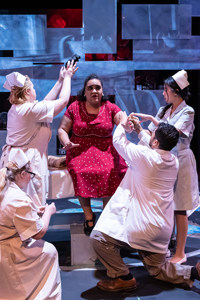A theater student at the Community College of Aurora is learning more than just lines after having the lead role in the play “HeLa.” Genesis Burgess said she’s amazed by the story of Henrietta Lacks and what her family has gone through since learning that her cells are responsible for significant medical breakthroughs.
“I believe she loved life and loved people,” said Genesis Burgess, who starred as Henrietta Lacks in November. “This role was so special because I’m not playing a character I’m speaking on behalf of a woman who I’m still learning about.”

Like many people who hear about the HeLa cells, Burgess is learning about the woman who unknowingly changed the scientific and medical worlds. HeLa is based on the life of Henrietta Lacks, whose cells were taken by medical researchers without her knowledge or consent. These cells are the basis for life-saving medicine and launching multi-billion dollar industries.
Burgess attributes CCA theater director Stacey D’Angelo’s passion and knowledge for theater and teaching as an inspiration to become a theater teacher herself. After completing theater classes at CCA, Burgess is going to pursue a degree in theater and English at Metropolitan State University in Denver.
As for the play, Burgess said it was a “life-changing experience.”
“What made this opportunity so beautiful and life-changing was the people I was able to do it with,” Burgess said. “My cast was incredibly kind, encouraging, and loving. I may have been the lead, but they are the heart behind HeLa.”
The HeLa cells are often cited as a major example of the inequalities that are prevalent in scientific and medical research. Henrietta Lacks and her family is Black and was not asked if her cells could be replicated in laboratories and sold around the world.
In 1951, Henrietta Lacks visited Johns Hopkins in Baltimore after experiencing significant bleeding. Doctors discovered she had cancer. She died at the age of 31 and eight months after her diagnosis.
Unknown to her and her family, medical researchers took samples of her cancerous tumor and ran tests with them. Known as “HeLa” cells, Henrietta Lacks’ cells were the first human cells to replicate indefinitely in a lab and outside of the human body for more than 36 hours, according to Hela100.org.
These cells were “unique, growing by the millions, commercialized, and distributed worldwide to researchers, resulting in advances in medicine.” Her family says they were not told about the cells until 1975, some 20 years after she died. The polio vaccine and the HPV vaccine are some medicines that were created from HeLa cells.
In 2013, the Lacks family entered into the HeLa Genome Data Use Agreement, giving her descendants a say in regulating the HeLa genome. Medical, scientific, and bioethical communities continue to work with the Lacks family to advance discoveries using HeLa cells and honoring Henrietta Lacks.
Burgess hopes that attendees of the play and Lacks’ family find a sense of healing after seeing HeLa.
“I think I speak for the HeLa team when I say we’re deeply sorry for the loss of your loved one,” Burgess said. “We are deeply sorry for the way she (and the family) were unjustly treated. We are beyond honored and grateful for the opportunity to share her story.”

//// Upcoming Performance Dates
Thursday, January 26 at 7:30 p.m.
Friday, January 27 at 2 p.m. & 7:30 p.m.
Saturday, January 28 at 2 p.m. & 7:30 p.m.
Tickets are FREE and doors open 30 minutes before curtain.
The production will be held on CCA’s CentreTech Campus in the Fine Arts Building, located at:
16000 East CentreTech Parkway Aurora, Colorado 80011-9036.
